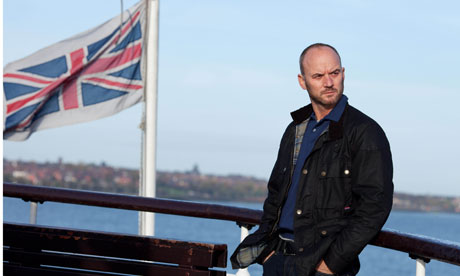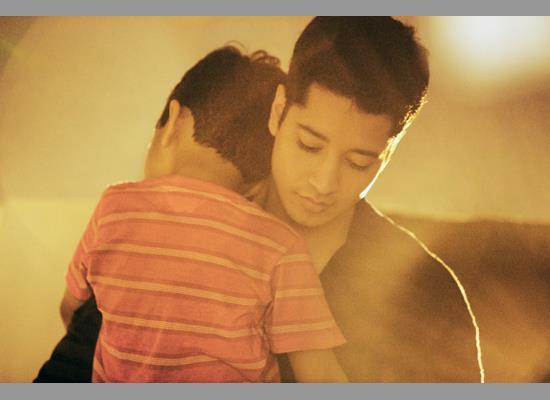- I was comically oblivious to the big news of the day. During the screening of "Outside the Law" that I was attending, apparently 1200 protesters gathered outside the theater and police wielding batons and riot shields were called in to maintain order. The protest was inspired by the film's depiction of the Setif Massacre in 1945, which the film depicts as an unprovoked slaughter of Algerians by the French - the protesters argue that the French were only restoring order and fighting armed militants. To be fair, this all isn't quite as big as it sounds - a large amount of the protesters were around at the time of the massacre, making the average age of the crowd about 65, and the protest dissipated before the end of my screening (hence my obliviousness). None of that stopped me from having a mild retroactive freak-out in any case.
- Best Red Carpet Performance of the Day: A quite-possibly drunk Jamel Debbouze decided to grab a camera from one of the photographers at the "Hors-La-Loi" photocall. He then spent his entire time on the carpet snapping shots of the wall of photographers in front of him. He later attempted to pull down the large plastic Palme D'Or affixed to the wall during the regular interview.
- Apichatpong Weerasethakul's "Uncle Boonmee Who Can Recall His Past Lives" wins the award for best press kit by a country mile. At the screening, staffers handed out the small hardcover book, which has a gold-embossed cover and contains pages of Weerasetakul's sketches and fold-out photos to go with the usual information. But don't think it's just the press kit talking when I say that the movie is on another level compared to rest of the competition, which I mean partially in terms of quality but more in the cosmic space-time sense. I guess I have to find words to address this elliptical and mesmerizing experience (favorite reaction I heard about - Variety's Robert Koehler interrupting a conversation about the film with "Don't you dare try to explain it!"), but I know that I want to see this one again immediately, which is a feeling I haven't had about anything else in the competition.
- If the name sounds frightening, know that Weerasethakul goes in press conferences by the self-applied nickname "Joe", which may be the most endearing filmmaker gesture ever.
Route Irish (dir. by Ken Loach) - In Competition
 Poor Doug Liman - not only was his Iraq War-related thriller met with overwhelming indifference by the majority of the press, but it was upstaged just six hours later by the new Iraq War-related thriller from legendary British director (and two-time Palme D'Or winner) Ken Loach. "Route Irish" represents a kind of culmination in Loach's slow progress towards the mainstream during the past decade with films like war movie "The Wind That Shakes the Barley" and the comedy "Looking for Eric" - "Irish" wouldn't be out of place in your average multiplex, and as it turns out, that's not a bad thing.
Poor Doug Liman - not only was his Iraq War-related thriller met with overwhelming indifference by the majority of the press, but it was upstaged just six hours later by the new Iraq War-related thriller from legendary British director (and two-time Palme D'Or winner) Ken Loach. "Route Irish" represents a kind of culmination in Loach's slow progress towards the mainstream during the past decade with films like war movie "The Wind That Shakes the Barley" and the comedy "Looking for Eric" - "Irish" wouldn't be out of place in your average multiplex, and as it turns out, that's not a bad thing.The title refers to "the most dangerous road in the world", the highway between Baghdad airport and the military-secured Green Zone in the center of the city. Private military contractors and best friends since childhood Fergus (Mark Womack) and Frankie (John Bishop) shared a tour of duty acting as bodyguards for travelers on this road, but after Fergus has returned home to Liverpool, Frankie is killed in a mysterious ambush. The official explanation is vague, a mysterious package Frankie left for Fergus has some frightening details about private military company misconduct, and Fergus needs to ask a lot of questions and look menacing, etc.
This, of course, is a plot that wouldn't be out place in a boilerplate thriller directed by, let's say, Doug Liman, but Loach does a lot of clever set-up to plant the seeds for the unexpected path the film eventually takes. I'm going to be vaguer than most critics have been about the film's central moral arc, because I do think that the way it slowly and surprisingly reveals itself is quite stunning. Suffice to say though that where the first part of film takes pains to emphasize Iraq's distance, relying on the mediating technology of cell phones and Skype to separate the two worlds and depicting the Liverpool setting with watery blues and sleek modern architecture, the second half brings Iraq home in frightening visual and thematic ways. "Route Irish" soon reveals itself to be a novel take on depicting the toxic effect of war on men returning home, employing metaphor instead of the relative realism of films like "The Messenger" or "Stop-Loss".
Once all the dust has settled, you may actually realize a strong plot similarity to a few other prominent films (annoying hint: both the ones I'm thinking of were in competition at Cannes!), and there is a dull preachiness to how the film handles the issue of military companies run amok. But it's hard to care too much, given the depth of feeling that Loach has summoned to back up the plot here. A romance between Fergus and Frankie's widow is haunting, although not as much as the bro-mance between Fergus and Frankie themselves, a pair of friends whose long-standing devotion to each other is expressed poignantly through a concise childhood scene where the two teens share a bottle of malt liquor on a ferry. I don't think that "Route Irish" is at the very top tier of competition titles this year, but it's a solid and moving accomplishment that reaffirms that Loach is a powerfully relevant voice even after a career of nearly 40 years.
Udaan (dir. by Vikramaditya Motwane) - Un Certain Regard
 My least favorite scenes in movies about artists force the viewer into accepting an opinion about the art they produce. Take one scene in "Udaan", a film about a boy who wants to be a writer and a father who wants him to go into the family business. At one point, the boy recites a poem he has written to a group of people that includes his father. The reaction that director Vikramaditya Motwane clearly is looking for from his audience is "What a talented young man! If only his father was more understanding!". The actual reaction is "Don't quit your day job."
My least favorite scenes in movies about artists force the viewer into accepting an opinion about the art they produce. Take one scene in "Udaan", a film about a boy who wants to be a writer and a father who wants him to go into the family business. At one point, the boy recites a poem he has written to a group of people that includes his father. The reaction that director Vikramaditya Motwane clearly is looking for from his audience is "What a talented young man! If only his father was more understanding!". The actual reaction is "Don't quit your day job.""Udaan" is the first film from India to play in a competition category in seven years. It is also, unfortunately, a film that has no business playing here, with its tediously overdone plot (this topic that has been done to death in any culture, but particularly so in recent Indian cinema), reliance on gushing mawkish sentiment, and child-in-peril emotional manipulation that would make Alejandro Gonzalez Inarritu proud. This all may sound overly harsh for a modest little film from a first-time director, but I'm terribly disappointed given that Anurag Kashyap was a writing and producing partner. Kashap has been one of the most exciting voices in Indian cinema over the past decade, and his "Black Friday" is in particular a landmark of sorts - a "Battle of Algiers"-styled investigation of the build-up to and aftermath of the 1993 Bombay bombings.
In fact, commercial cinema in India as a whole has been undergoing an interesting transformation. The rapid growth of multiplexes in even the smallest areas of India has allowed for the new rise of niche film instead of the must-appeal-to-all-demographics bland universality of much of traditional Bollywood cinema. Other directors like Vishal Bhardwaj and Dibakar Banerjee have been doing exciting and innovative work, so it's especially irritating to see India being represented by piffle like this.




No comments:
Post a Comment